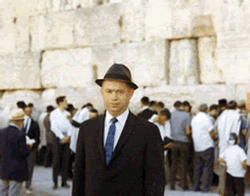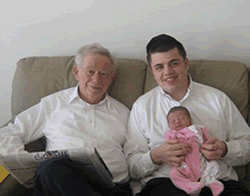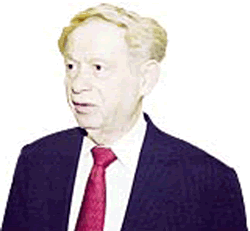Zev Wolfson (1928- 2012)
One of the greatest Jewish philanthropists made sure to stay under the radar. What was behind his relentless drive?
by Jonathan Rosenblum
Every human being is unique, but most at least fall into certain broad categories and possess traits that are similar to others. Zev Wolfson z”l, who passed away last week at the age of 84, however, can be truly described as sui generis, a one-of-a-kind individual unlike anyone in the generation (and perhaps in previous generations as well). I asked him many times what was the source of his intense drive, but never received any kind of satisfactory response. Idle speculation, with no connection to practical results, held no interest for him. And of all the subjects for which he had no interest or time, the subject of Zev Wolfson ranked near the top.
He was just post–bar mitzvah when, fleeing their native Vilna, the family was exiled by the Soviets to Siberia. Two years later, he carried his dead father on his shoulder in order to ensure he received a Jewish burial in the frozen tundra of Kavkazakhstan, and undertook the support of his mother and younger brother. Those early experiences no doubt contributed to his toughness. But they still do not explain him — in particular, they do not explain his sense of mission for ensuring the continued existence of the Jewish People.
Within five years of immigrating to the United States from the USSR, at the age of 17, he was well on his way to his first success in business and had begun to learn his way around Congress. The two actually went together. His first lobbying effort was an attempt to lower the excise tax on a product he sold. When his efforts bore fruit, he thought to himself, “Why should I do this for myself? I can do the same thing for the Jewish People.” Thus began a career as a one-man lobbying operation on behalf of the Jewish people.
Perhaps the one word that best describes him is “relentless.” When he fixed on a goal, whether in business or lobbying for the Jewish nation or giving tzedakah — or melding five different biological sets into one blended family — he was never impeded by obstacles. That was not in his lexicon.
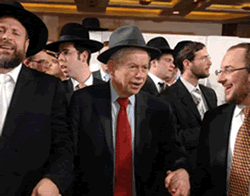
Holy Chutzpah
Rav Aharon Kotler ztz”l, the Rosh Yeshiva of Lakewood, was one of the first to appreciate the talents of the young man with the bright red hair. When asked how he first met Reb Aharon, Zev replied, “I heard he needed help. So I went to meet him.” Reb Aharon remained his hero and rebbi for the rest of his life. He revered Reb Aharon for his total dedication for the Jewish people without any trace of self-interest.
Some of Reb Aharon’s students resented the presence of the young businessman, with little yeshivah background, whom they viewed as possessing a surfeit of chutzpah. But Reb Aharon recognized that Zev’s chutzpah could be harnessed to the service of the Jewish People.
The two shared a willingness to endure any humiliation for the sake of their fellow Jews. Reb Aharon famously said, “I would work with the pope if it would save the fingernail on the hand of a single Jewish child.” And one of Zev’s greatest strengths was that he did not know the meaning of the word embarrassment, and never let the possibility of humiliation interfere with his pursuit of the goal. On one of his early lobbying missions to Washington, the secretary of a senator to whom he wished to speak denied him entrance to the senator.
He turned to his friend Amos Bunim, who had accompanied him, and told him to distract the secretary. He then jumped over the partition and entered the senator’s office, risking arrest.
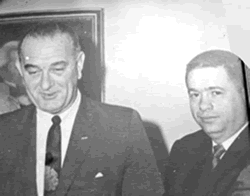
Saving Israel Millions
While still in his mid-20s, he played a major role in saving the funding for the nascent Chinuch Atzmai system in Israel. He convinced Senator Homer Capehart of Indiana to write a letter to Secretary of State John Foster Dulles extolling the virtues of Chinuch Atzmai. On a visit to Washington DC, Israel’s finance minister Levi Eshkol was flummoxed when leading members of the Senate Foreign Relations Committee kept asking him about Chinuch Atzmai, which they could not come close to pronouncing. But he got the hint that Israel’s foreign aid requests would be viewed more favorably if the Israeli government took a more generous position toward Chinuch Atzmai.
When the economic history of the State of Israel is written, Zev Wolfson will be one of the three crucial figures in its first half century.
Although Levi Eshkol was left sputtering on that occasion, a series of Israeli finance ministers had much reason over the years to give thanks to the Almighty for Zev Wolfson. A senior finance ministry official once told me that when the economic history of the State of Israel is written, Zev Wolfson will be one of the three crucial figures in its first half century, after only David Ben-Gurion and Pinchas Sapir, the long-time finance minister (with whom Zev worked closely).
Working with leading figures in Congress, most prominently Senator Daniel Inouye of Hawaii, he succeeded in having inserted into foreign aid appropriation bills, on several occasions, provisions altering the repayment terms on US governmental loans to Israel, or having the loans changed to grants. The resulting savings to Israel totaled billions of dollars.
In 1985, at a time of hyperinflation in Israel, Mr. Wolfson saved Israel hundreds of millions in interest payments by shepherding through Congress an appropriations bill that permitted Israel to refinance existing loans at much lower interest rates by prepaying the existing loans with the benefit of US loan guarantees. In 1989, when Israel was in desperate need of money to absorb hundreds of thousands of refugees from the FSU, Mr. Wolfson played a major role in securing $10 billion in US government loan guarantees.
Nor were his efforts on behalf of Israel limited to the economic sphere. In 1968, Israel’s ambassador to the United States, Yitzchak Rabin, was eager to have language written into the foreign aid bill favoring the sale of Phantom jets to Israel. He turned to Zev to use his connections on Capitol Hill, and it was done. The two men became close friends. Zev was often on the phone with Prime Minister Rabin from the moment he landed in Israel and would stop at the latter’s Ramat Aviv apartment on his way back to the airport.
Under the Radar
During the first Gulf War, Zev invited Senator Inouye out on his boat, which he used almost exclusively for entertaining politicians or officials he felt it important to impress. He asked Senator Inouye if there was not anything in the American arsenal to protect Israel from the Iraqi Scud missiles. The senator told him about the Patriot missile batteries. If so, Zev asked, why hadn’t the United States supplied Israel with the Patriots?
Senator Inouye replied that Israel must not have sought them. Zev immediately got on the yacht’s phone and called then-defense minister Yitzchak Rabin to relay the message. The next day’s New York Times headline read, “US to supply Patriots to Israel.” The last paragraph explained that the decision had been taken after a meeting between “US officials and Jewish leaders.”
The vast majority of these lobbying efforts were at Mr. Wolfson’s individual initiative, based on his keen understanding of where the levers of power in Congress lay — an understanding fostered, in part, by frequent reading of the Congressional Record.
If he had been the slightest bit interested in public recognition, his achievements would have come to a quick halt.
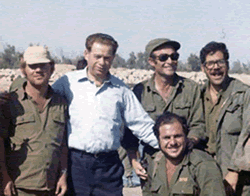
One point about his lobbying efforts must be emphasized. Had they not been conducted entirely under the radar, without any fanfare or publicity, they could never have been successful. If Mr. Wolfson had been the slightest bit interested in public recognition for his achievements, those achievements would have come to a quick halt.
While Mr. Wolfson hosted many fundraising affairs for politicians and made modest political contributions of his own, the source of his greatest influence was his passion for the causes that he believed in. Former senate majority leader Trent Lott attributed much of his influence in Congress to the fact that he never sought anything for himself.
And although Mr. Wolfson’s DC lobbying efforts took place under the radar, their impact was well known to senior officials in Jerusalem.
For approximately two decades, a special section of the annual defense allocations in the Israeli budget was known as Se’if Wolfson. The monies in that section were directed to projects determined by Mr. Wolfson.
He persuaded French president Jacques Chirac, for instance, to supply land for Otzar HaTorah schools, which primarily served immigrants from North Africa, and then paid for the building with monies from the Israeli government. Similarly, he obtained millions of dollars via the Israeli government for Jewish education in the FSU.
In the 1960s and ’70s, Mr. Wolfson obtained US government funding to build dozens of institutions in Israel, under a provision for schools and hospitals abroad from the USAID budget. Most of those institutions served children of Jewish refugees from Arab lands, a group extremely close to his heart. Once the schools and residential educational centers were built, he was often able to secure further funding from the Israeli government.
All these efforts to obtain government funding were the product of his early insight that governments can provide funding at a level far beyond that possible through private philanthropy.
By the ’90s, however, Mr. Wolfson found his ability to fund his projects via either the Israeli or American governments greatly circumscribed. In Israel, the era in which Pinchas Sapir ran the Israeli economy out of his coat pocket, without bureaucratic hindrance and with little transparency, had passed. And in the United States, politicians were under a much closer scrutiny — of which much stricter campaign finance laws are only one manifestation.
At that point, Mr. Wolfson began giving from his personal fortune on a scale perhaps unprecedented in Jewish history. He had his own goals clearly in mind, and was himself the initiator of many projects. The focus of his giving was overwhelmingly on Jewish outreach projects around the globe. He was constantly searching for people he viewed as capable of achieving great things and projects that would have a major impact. He was attracted by those who thought big, and often complained that there were not enough high-impact projects for the money he wanted to give.
God’s Money
He had no doubt where his wealth came from. Upon being introduced to Mr. Wolfson for the first time, the chairman of Merrill Lynch asked him how he had acquired his wealth. “God gave it to me,” Zev replied, without hesitation. He felt no need to expand.
He not only believed that God had given him his wealth, but that the money belonged to God, and was only entrusted to him as long as he used it for God’s purposes. In the midst of the most intense business negotiations, he almost never failed to take a call regarding one of his projects or from a family member. Into his 70s, he still flew economy class.
Just as he did not treat his money as his own with which to pamper himself, so he did not feel entitled to spare himself any humiliation in furthering his goals for the Jewish people. He thought nothing of sitting by the desk of the lowest functionary in the Israeli finance ministry to make sure that the transfer he sought was processed as expeditiously as possible, and then taking the papers on to the next bureaucrat up the chain. No amount of abuse could deter him in the pursuit of whatever goal he had trained his sights on.
He would not permit the money with which he had been blessed to become a source of honor. Where other large donors condition their gifts on having buildings named after them, Zev always insisted on the opposite condition — that his name not be linked to whatever cause he was supporting.
Yet if he viewed his wealth as a Divine trust, he also believed that God had entrusted it to him because He approved of his judgment in dispersing it. And he gave with that confidence. He did not just support the existing communal agenda, but in large measure determined it. He insisted on accountability in all his charitable projects, and empirical markers to determine progress. He made it clear to recipients that his goal was not to make their lives easier but to extract the maximum from people with the talent to make things happen.
That included preparing themselves for financial independence so he could start new projects.
He would use his vast array of connections to help individuals. When he heard, for instance, that a senior rabbi in Torah Umesorah had suffered partial facial paralysis on a trip to Brazil, he arranged within half an hour for him to meet two of New York City’s leading neurologists, both with six-month waiting lists, before office hours the next morning. He sent a limousine to bring the rabbi from Lakewood to the appointments, while he traveled by subway to meet at the first doctor’s office.
Yet he was unsentimental in his support of charitable projects and did not let friendship determine to whom he would give or at what level: he didn’t believe he had the right to let friendship cloud his judgment about where to give his money. If that impartiality led to some resentment, he did not let it bother him one whit.
No Time for Praise
Zev Wolfson was one of those rare figures of whom it can be said without fear of contradiction that he changed the course of history.
His greatest joy in his later years was to be surrounded by as many children, grandchildren, and great-grandchildren as possible. On a typical Sunday afternoon, there would be up to 35 offspring in the house. The home was kept completely child-friendly, devoid of expensive furniture or easily breakable items.
Click here to receive Aish.com's free weekly email.
His greatest source of pride was the knowledge that his lifetime work on behalf of the Jewish people will be continued by his family with a dedication that they learned from him. Two of the children are involved in frontline outreach work; one son is an internationally renowned explicator of the Written Torah; his sons have taken over the direction of Keren Wolfson; his beloved wife, Nechama, directs her own multiple educational projects in both America and Israel, and each one of the children is actively involved in multiple chesed projects.
A longer version of this article originally appeared in Mishpacha Magazine.
Photos: Family Archives, Shuvu Archives, Wolfson Foundation, Meir Haltovsky
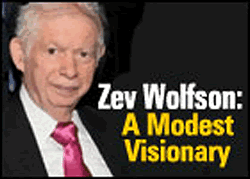
Zev Wolfson was born in Vilna ( then Poland) in 1928.In June of 1941 the Nazis invaded the Soviet Union ( which included the Vilna/Vilnius area which was then part of Lithuania). Zev's family fled east to escaped the Nazis and lived in Siberia during the war years. Soon after the war ended the family (which included his mother and younger brother) was able to obtain papers to come to the U.S. Zev was able to provide a yeshiva education for his younger brother. In his 20s, Wolfson amassed a significant wealth through his investments in real estate. (".. a lifelong devotee of some of the leading yeshiva world personalities, providing financial assistance to rabbinical students and Torah institutions in Israel, Europe, Russia and the U.S. He also was a tireless advocate for Israel, politically as well as financially..." http://www.thejewishweek.com/editorial-opinion/editorial/legacies-learning)
His wife, Nechama, founded the Shalom Task Force in 1992, she is well known for her efforts to combat domestic violence within the Jewish community. Children: Aharon and Elisheva ( wife of Rabbi Y. Oratz).
Zev Wolfson / By JONATHAN ROSENBLUM
08/23/2012 16:33
The full account of his giving is unknown because Wolfson did not want the world to know he was a giver.
The only notice in these pages of the passing last week of Zev Wolfson was a brief Jewish Telegraph Agency story, which mistakenly placed his burial in Jerusalem.
This is odd, given that he was the greatest Jewish philanthropist in recent history – and arguably in Jewish history.
Wolfson would no doubt have been amused by the lack of media attention; He spent a lifetime avoiding the limelight. Whereas most givers condition their largesse on buildings being named after them, he was the opposite. All his institutional giving was conditioned on there being no mention of it.
Shunning recognition was only one aspect of how he differed from other philanthropists. He did not just give his money to existing organizations and institutions. He pursued a specific agenda and encouraged those who took the initiative in developing projects furthering that agenda. He once described his philosophy of giving as supporting those projects and institutions that others were not.
One such area was Jewish schooling for Russian speaking children after the fall of the Soviet Union – whether in New York City, the FSU, or Israel. Another was the Otzar HaTorah network of schools, primarily for North African immigrants, in France.
A full account of his giving is impossible. He himself did not know how much he had given, or to whom. He did not recognize someone to whom he had given a $100,000 check two weeks later. But the bulk of his largesse over the last two decades was to promoting knowledge of Torah among non-observant Jews around the globe.
A WAR refugee from Vilna at the age of 13, he spent the remainder of the war in Siberia. At 15, he carried his father’s dead body over his shoulder to bury him in the frozen tundra, and took responsibility for the support of his mother and younger brother.
The experience of the war no doubt contributed to his lifelong obsession with ensuring the continued existence of the Jewish people. But it cannot fully explain his sense of mission. He was totally sui generis – incomparable to anyone I have ever met in his relentless drive and refusal to be deterred once he had fixed upon a particular goal. He could not be humiliated and thus was undeterred by the possibility of embarrassment. And he was deaf to the word “no.”
A group of young Orthodox professionals once came to his office for advice about how to become involved in Jewish communal activity. He said, “You’re not interested in becoming involved. If you were interested, you would just do it and not talk about it.” He proceeded to tell them that when he was their age, he had taken a train to Washington and knocked on every senator’s door. All but one slammed the door in his face.
On another early Washington trip, the secretary of a senator he had wanted to see refused him entry. He told the friend who accompanied him to distract the secretary, jumped over the office partition and walked into the senator’s office.
IT IS impossible to disburse tens of millions of dollars in charitable contributions annually in complete anonymity. But in one area, Wolfson’s contributions were unknown outside of the upper echelons of the Israeli government. For decades, he acted as a private, one-man diplomatic corps for Israel in the US Congress.
In his early 20s, barely five years after arriving in the United States, he had already figured out the levers of power in Congress to a remarkable degree. The managing partner of one of the world’s most prestigious law firms opined at the shiva house last week that if American leaders during the Holocaust had possessed his understanding of how much could be done in Congress, rather than focusing entirely on petitioning President Roosevelt, many more Jews might have been saved.
A former senior official in the Finance Ministry told me that apart from Pinhas Sapir, he cannot think of another person who had such an impact on Israel’s early economic viability.
Wolfson was personally responsible for saving Israel hundreds of millions of dollars in interest payments on US government loans on several occasions by working together with leading figures in Congress, most prominently Senator Daniel Inouye of Hawaii, to alter Israel’s repayment terms or transform loans into grants.
In 1985, during a period of hyperinflation in Israel, Wolfson shepherded through Congress a bill that permitted Israel to refinance billions of dollars of existing high-interest loans at much lower interest rates by prepaying the existing balance with the benefit of US loan guarantees. In 1989, when Israel was in desperate need of money to absorb hundreds of thousands of refugees from the FSU, Wolfson played a major role in securing $10 billion in US government loan guarantees.
Nor were his efforts on behalf of Israel limited to the economic sphere. In 1968, Israel’s ambassador to the US, Yitzhak Rabin, sought language in the foreign aid bill favoring the sale of Phantom jets to Israel. He turned to Wolfson to use his connections on Capitol Hill, and it was done. The two men became close friends. Wolfson was on the phone with Rabin from the moment he landed in Israel, and would often stop at the Rabin’s Ramat Aviv apartment on his way back to the airport.
Just before the first Gulf War, Wolfson invited Senator Inouye out on his boat and asked if there was not anything in the American arsenal to protect Israel from Iraqi Scuds. Inouye told him about the Patriot missile batteries. Wolfson asked him why the US had not supplied Israel with the Patriots.
Inouye replied that Israel must not have sought them. Wolfson immediately got on the phone and called Rabin to relay the message. The next day’s New York Times headline read, “US to supply Patriots to Israel.” The last paragraph explained that the decision had been made after a meeting between “US officials and Jewish leaders.”
The vast majority of his lobbying efforts, particularly in the economic sphere, were at his own initiative.
Had those efforts not been conducted entirely under the radar, without any fanfare or publicity, they could never have been successful.
While Wolfson hosted many fund-raising affairs for politicians and made modest political contributions of his own, the source of his greatest influence was his passion for the causes that he believed in.
Former Senate majority leader Trent Lott attributed much of Wolfson’s influence in Congress to the fact that he never sought anything for himself.
His political connections also benefited Jewish education around the globe. From the early ’60s through the mid-’70s, he secured US government funding, under the USAID program, to build dozens of residential educational institutions in Israel. Most of those institutions served children of refugees from Arab countries – a group particularly close to his heart. He also persuaded French president Jacques Chirac to make available the land for the Otzar HaTorah schools in France. In gratitude for the enormous sums his efforts saved Israel, the Israeli government distributed tens of millions of dollars to Jewish educational institutions in the FSU, France and Israel at his suggestion.
HE LIVED with a sense of mission. Meeting Wolfson for the first time, the chairman of Merrill Lynch asked him how he had acquired his wealth. “God gave it to me,” he replied. He felt no need to expand.
He believed that his wealth was entrusted to him only so long as he used it for God’s purposes. Into his 70s, he still traveled economy class on his frequent trips to Israel. He once berated the director of one of his programs for bringing him bottled rather than tap water in a hotel lobby. In the midst of the most intense business negotiations, he rarely failed to take a call concerning one of his projects or from a family member.
At an age when others with similar wealth are contemplating their retirement homes, he was still trying to squeeze every last dollar for charitable work. When a website went up that offered to process credit-card charitable contributions without deducting fees from the recipient charity, he gave so many millions of dollars that the owners of the site sometimes had to close it down.
He was a demanding boss, in charitable endeavors no less than business. He insisted on accountability in all his charitable projects and empirical markers to determine progress. (A daughter said at the shiva that she had grown up thinking her father was a school principal, so many times had she heard him shout over the phone “How many students?”) He made it clear to recipients that his goal was not to make their lives easier but to extract the maximum from them.
That included preparing themselves for financial independence so he could start new projects.
He brusquely put a stop to anyone who thanked him or praised him. He firmly believed that “Anyone could have done what I did. You just have to try.”
The only compliment I ever saw him accept with a smile was: “You didn’t spoil your children.” He could not make them as tough as he was – they did not have to endure the same childhood experiences – but he pushed them hard not to give up on tasks and to use their time to the maximum. He could grumble over the course of an entire Shabbat about a teenage son’s purchase of a $20 tie he considered excessive, and a number of the children told me they first learned they were rich from classmates or their spouses.
Every one of his 10 children is fully involved in the family business of ensuring the Jewish future – three of them as front-line Jewish outreach workers. That was his greatest pride.
The writer is director of Jewish Media Resources, has written a regular column in The Jerusalem Post Magazine since 1997, and is the author of eight biographies of modern Jewish leaders.
--------------------------
Zev Wolfson of Lawrence, NY, an unassuming retired businessman, who recently passed away at the age of 84. Would you ever have known that the generosity, vision and dedication of this man has impacted millions of Jews throughout the world? Even the Jewish professionals and lay leaders among us, who were fortunate enough to be involved in one of the countless Wolfson projects, know little beyond their own experience. How could they? No interviews were given to newspapers; nor were there any telltale signs of philanthropy: no names on buildings, no awards, no dedication ceremonies. Just tens or maybe hundreds of thousands of children receiving a Jewish education; hundreds of community Rabbis and educators leading vibrant communities in places where Jewish life seemed hopeless just a short time ago. Tens of thousands of Jewish university students connected with their heritage through Israel trips and campus programs. Countless poor Jews in Israel given vocational training and empowered to support their families with dignity and strengthen the Israeli economy.
Then there is the part of the story which seems most improbable of all; how Zev Wolfson became the ‘go-to person’ for Israeli prime ministers in lobbying Washington. In fact, his influence in Washington played such a powerful role that Shimon Peres was recently quoted saying that ‘Zev Wolfson rendered more assistance to the State of Israel then Ben-Gurion himself’ and Yitzhak Rabin said of him ‘he didn’t know one other Jew in the world, who as an individual, had done more for the State of Israel’.
To truly appreciate the audacity of this role, it’s important to remember that Zev Wolfson was then a relatively recent immigrant to the US. He was born and raised in Vilna, Lithuania. He survived the war because his family was deported by the Soviets to Siberia, and then made his way to the U.S. He went into business selling television vacuum tubes and then got into real estate. It was sometime in the 1950’s, when an Israeli delegation was visiting New York, he saw an Israeli flag in front of the hotel where they were staying and asked himself ‘what am I doing to help Israel?’. Most of us would have dropped a nice donation to alleviate our guilt and moved on with our lives. Zev began spending time in Washington, passing the halls of the Congress and Senate. He would attempt to make friends, to help out campaigns, to do whatever he could do. He was not a major business man then, he was just a somewhat successful, recent immigrant from Eastern Europe. I wonder what the politicians made of this young man; with what must have been a somewhat heavy accent and imperfect English.
Then came 1967, after the six day war, when France abandoned her strong alliance with Israel and instead, began arming neighboring Arab states. France, not the US, was then the major supplier of arms to Israel and France had just abruptly canceled all military contracts. Israel was in trouble. Shimon Peres called everyone he could including Zev Wolfson to see what they could do in helping to lobby for an alliance with Washington. This was the age before AIPAC, before the US considered Israel it’s closest ally in the middle-east, before bi-partisan support of Israel in both House and Senate was a given of US politics. The extent of what Zev Wolfson accomplished may never be known. We only know that for a time, he was a one man Israel lobby in Washington – the ‘go-to person’ for Israeli prime ministers – helping to secure an eleventh hour arms shipment as Israel was running out of ammunition in the Yom Kippur war – working to lower the interest rate Israel paid on its US loans when the Israeli economy was on the rocks.
He was always ‘thinking out of the box’, before ‘thinking out of the box’ was in vogue. This trait permeated everything he did; from his classic style of leveraging every connection against every other connection in a never ever ending quest to strengthen not just Israel, but the entire Jewish people. Business connections were leveraged to help politicians, who were in turn leveraged to gain aid for Israel; funds coming in to help Israel were leveraged to support Jewish education in the Diaspora. He was audacious; like the time he drove the length of Fifth Avenue in the opposite direction. He was driving a U.S. Senator to march in the Israeli day parade. The Senator was supposed to march in front of the Parade, but when they arrived, the streets were already closed off and they were at the very beginning of Fifth avenue. Zev drove his Cadillac right on to the then empty Fifth Avenue, driving against the normal flow of traffic. The startled Senator asked; ‘what are you doing? We will be arrested!’, Zev calmly replied that any police officer seeing a car going in the opposite direction on Fifth Avenue, would most likely assume that it must have some kind of official permission (they were never stopped, but as they say; don’t try this at home).
What made Zev Wolfson different? Certainly there are many Jewish billionaires, plenty of the them became successful by thinking ‘out of the box’. There are countless kind-hearted and dedicated Jewish philanthropists, lay leaders and professionals. What makes someone into a true leader, a hidden pillar of the Jewish people? I don’t have a full answer, but certainly a part of it has to do with a simple idea; a feeling responsibility for the problems faced by the Jewish people. Not the ‘let’s do something about a problem’ type of responsibility common in philanthropy, but rather the type of responsibility most of us reserve only for our personal lives, our children and the success of our careers and businesses. A type of responsibility that doesn’t allow for failure or settling for the ‘it was the best I could do.’ A responsibility which brings out one’s personal best. A responsibility that translates into strategic thinking, leveraging partnerships, making every dollar count, and always innovating.
I was privileged to witness a small portion of Zev Wolfson’s philanthropic vision as it evolved. In 1999, when I received my rabbinic ordination, Zev challenged me, along with a small group of peers, to found Shaarei, a center for Jewish life, catering to the needs of young Russian-speaking Jews like us, who felt disconnected from the wider Jewish community. It was a tempting offer, a $20,000 grant, leveraged with a matching grant from RSA, my rabbinical school, and it gave us a challenge to raise the rest of the budget and to become self-sufficient within 3 years. Everything about that grant was fine-tuned for maximum impact; the funding was just enough to give us a fighting chance and make us believe that if we worked hard, we could succeed. Countless similar community development projects were founded throughout the world.
As our organization grew, I remember the various phases of Zev Wolfson’s philanthropy, always focusing on reaching more and more Jews. At one point, the idea of making large hotel-based educational seminars became popular. One day, I walked into Zev Wolfson’s office to ask for funding to make one such seminar for our community. He asked ‘How much per student?’ I replied ‘$200’. ‘How many students?’ We wanted to make one seminar for 400. Then came the shocker: ‘I will only fund it if you can do 10 seminars.’ To Zev Wolfson, it wasn’t just about the 400 Jews reached through a weekend at a hotel, inspired to strengthen their Jewish identity, rather, it was about being responsible to reach every single Jew. If running seminars for young Russian American Jews was a new approach, his mind raced to scale the idea, to immediately ask what it would take to reach everyone.
How do we strengthen the Jewish people? How do we make sure that the next generation of young Jews establishes Jewish families, supports Israel and makes a commitment to a Jewish way of life?
I remember a visit to the Diaspora museum in Tel Aviv a few years ago, watching an old video about the Jewish community in Argentina. The community was comprised largely of Eastern European immigrants, some of whom arrived as early as the turn of the century, and some who were Holocaust survivors. Assimilation and intermarriage among their children was decimating the community. It did not seem to be a place where a generation later, you would expect to find the only kosher McDonald’s outside of Israel, along with dozens of other kosher restaurants. Clearly something was working right. Through a Zev Wolfson funded program in Buenos Aries, called Morasha, over 2000 college students each year were spending at least four and a half hours per week studying Judaism, attending Shabbatons and going on trips to Israel. Can such a program be adapted for Russian Jews in America? I thought. What would motivate them to join such a program? Would they commit four and half hours each week? That level of time commitment was vital, because it created a new social reality – very different from just attending a class or an event. This was the beginning of the RAJE Fellowship program, which in its sixth year, is now igniting Jewish life for the next generation of Russian American Jews in the New York area.
Did some higher authority appoint Zev Wolfson responsible? No, he appointed himself. A simple lesson we can learn from him is that the job of taking responsibly for the Jewish people is wide open to all of us. We can all open our eyes and choose to never look away, to take real responsibility. Not just ‘to do something about it’, but to follow Zev Wolfson’s lead in feeling truly responsible; making a plan, and seeing things through. For the philanthropists of means among us, the job of becoming one of the thirty six hidden Tzadikim, pillars of the Jewish people, is wide open as well. Seeing what one man can accomplish, we can only imagine the impact of having just a few more Jewish billionaires taking responsibility in this way. How much would the Jewish people be strengthened? How many of the chronic problems faced by our nation could be overcome?
Mordechai Tokarsky. Co-founder & Director of RAJE (Russian American Jewish Experience). More information on RAJE is available at www.rajeusa.com. Board members of RAJE include PR guru Ronn Torossian, leading NY Lawyer Edward Mermelstein, philanthropist Ron Hirsch and others.
